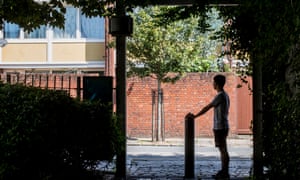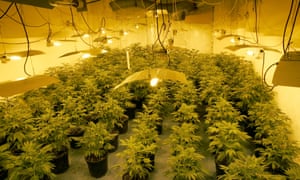What might make a young Vietnamese woman leave her home and family to make a dangerous trip across the world in search of a new life in the UK? Most likely, trafficking experts say, it was the promise of work in one of Britain’s proliferating high street nail bars.
Reports that a young Vietnamese woman was one of the 39 people who died this week in a refrigerated trailer have not been confirmed by police, but anti-slavery organisations have been trying to raise the alarm for years about the growing problem of Vietnamese children and young adults being trafficked into the UK.
Boys are usually sent to work in cannabis farms, locked inside converted houses and forced to tend the plants day and night, while the girls and young women are dispatched to work in nail bars. Both sexes are also frequently forced into prostitution.
It is a phenomenon that is hidden in plain sight. Because those trafficked are aware that they are in the UK illegally, they are wary of the police and extremely unlikely to report their own exploitation.
Some may not even recognise that they are victims of trafficking, since they may have chosen to travel to the UK in search of work, and will often have paid a people smuggler to organise the journey and to find them a job here.
The cost of travelling to Europe typically ranges between $10,000 and $40,000 according to Precarious Journeys, a report on people trafficking from Vietnam, published earlier this year by anti-slavery charities. The brother of Pham Thi Tra My said she had paid £30,000 to people smugglers to get her to the UK, and that this money had been returned to the family overnight as news of the tragedy emerged, according to the BBC.

The line between smuggling and trafficking becomes blurred on the journey. Most Vietnamese people working in cannabis farms or in nail bars know that their families at home are heavily in debt to their traffickers, for the cost of their journey, and remain trapped in this debt-bondage for years, trying to repay the debts, and too frightened to seek help.
It is a growing problem. While it is hard to get accurate statistics about the real numbers of trafficked Vietnamese people, because most remain hidden and undocumented, new figures from the Salvation Army, which works with victims of trafficking, show that more Vietnamese men were referred to the charity between July 2018 and July 2019 than any other nationality. The charity worked with 209 people from Vietnam over that period, a 248% increase on the number referred five years earlier. The charity Ecpat, which works with child trafficking victims, has also seen a steep rise in the number of Vietnamese referrals, from 135 in 2012 to 704 in 2018.
In her final texts, sent from the container as she was dying, Pham says she is from the Ha Tinh province of Vietnam, which is the site of the country’s worst environmental disaster, a chemical spill from a steel factory in 2016 that poisoned up to 125 miles of the northern coastline and devastated the local fishing industry.
Mimi Vu, a leading expert on trafficking of Vietnamese young people to Europe and the UK, said she had met a higher than usual number of people from the Ha Tinh province during visits to migrant camps in northern France last week.
“The Ha Tinh environmental disaster has been very problematic for fishermen whose livelihood was taken away. They need money immediately and that has been the push factor for migration,” she said. “She will probably have come willingly. Her family will have paid for her to go, thinking she will get a job and training in a nail bar in the UK,” said Vu, who has been working in Vietnam on trafficking and slavery issues for the past seven years.

This kind of trafficking is precisely the problem that the Modern Slavery Act, introduced by Theresa May in 2015, was supposed to tackle, but while anti-slavery organisations have welcomed the legislation, they have been disappointed at the lack of funding for implementation of its key measures.
Debbie Beadle, the director of programmes at the anti-trafficking organisation Ecpat, and co-author of a study into victims of trafficking from Vietnam to Europe published earlier this year, said: “The resources haven’t come to put it into effect. Many police forces and local authorities are still not trained or equipped to identify these victims of trafficking.” Because victims are not regularly being identified, there have been fewer successful prosecutions under the new human trafficking legislation than expected.
The first successful nail bar prosecution was last January, when three people were found guilty of conspiring to facilitate the movement of people for labour exploitation. Police found two Vietnamese girls working at the Nail Bar Deluxe in Bath. Both were working 60 hour weeks; one was being paid about £30 a month, while the other was not paid, and slept on a mattress in the attic of the nail bar owner’s home. They had been smuggled into the UK in the back of a lorry.
Often the victims are too frightened to cooperate with the police, and not recognised as victims of trafficking and are instead treated as criminals and deported back to Vietnam, where they are frequently retrafficked by the people smugglers who took them out of the country originally.
Because victims are so frightened of their traffickers they are usually very unwilling to speak about their experiences, even when they have been rehoused, and this reticence has contributed to the phenomenon remaining relatively little understood. But in an interview with the Guardian last year, Stephen, a vulnerable Vietnamese orphan, described being trafficked to the UK to work as an enslaved cannabis farmer when he was 10 years old.
Stephen, whose real name was not revealed to prevent him being identified by his traffickers, arrived in Britain in the back of a freezer lorry, after a long journey on foot and in trucks from Hanoi, where he had been destitute and homeless. In Britain, he was locked up alone in a series of terraced houses that had been converted into cannabis farms, and forced over the course of four years to work as a cannabis gardener by the Vietnamese gang that had smuggled him here.
It was impossible to look out of the windows, he said, because they were all covered with thick insulating plastic. He didn’t know if it was night or day and he didn’t know if he was in a location for weeks or months. Every few days, in the evening, a group of Vietnamese men would come to inspect the plants, bringing him food. “Sometimes I did something wrong that made some plants die. They would get angry and beat me. My life was much worse than when I lived in Vietnam.”

Once, a gang of British drug dealers kicked a door down, tied him up, and stole the entire cannabis harvest. When his own minders returned, they were angry, but simply moved him on to a new location, where he had to begin the process of cultivating cannabis seedlings again. In the next house, they no longer locked him inside, but they told him they would find him and kill him if he tried to escape. He never tried to flee because he had no idea where to go.
“I just lived day by day,” he said. “I couldn’t see anything in the future. No one was kind to me.”
Beadle said most of the victims the charity worked with had travelled to the UK hidden in the back of lorries. “They usually describe it as one of the most traumatic experiences of their lives.”
Trafficked Vietnamese and the lure of UK nail bars and cannabis farms – The Guardian

